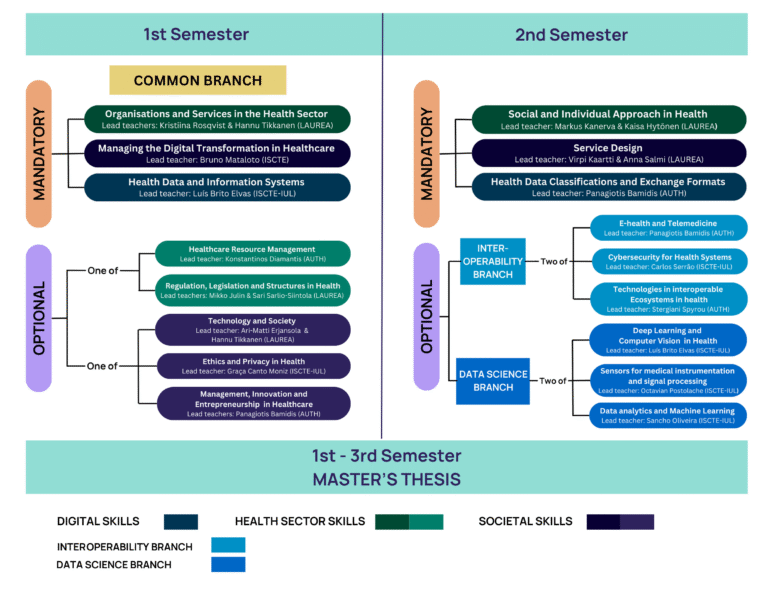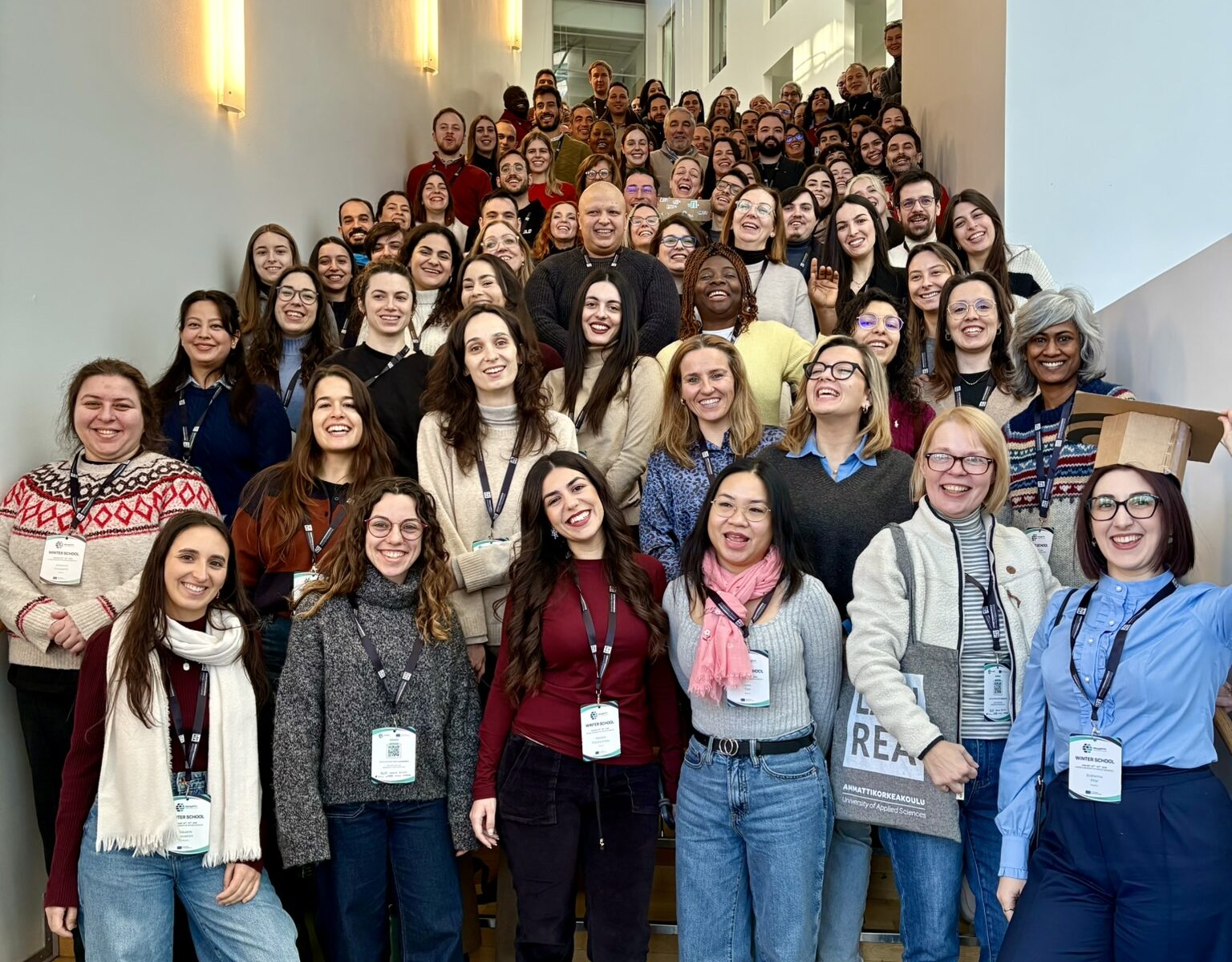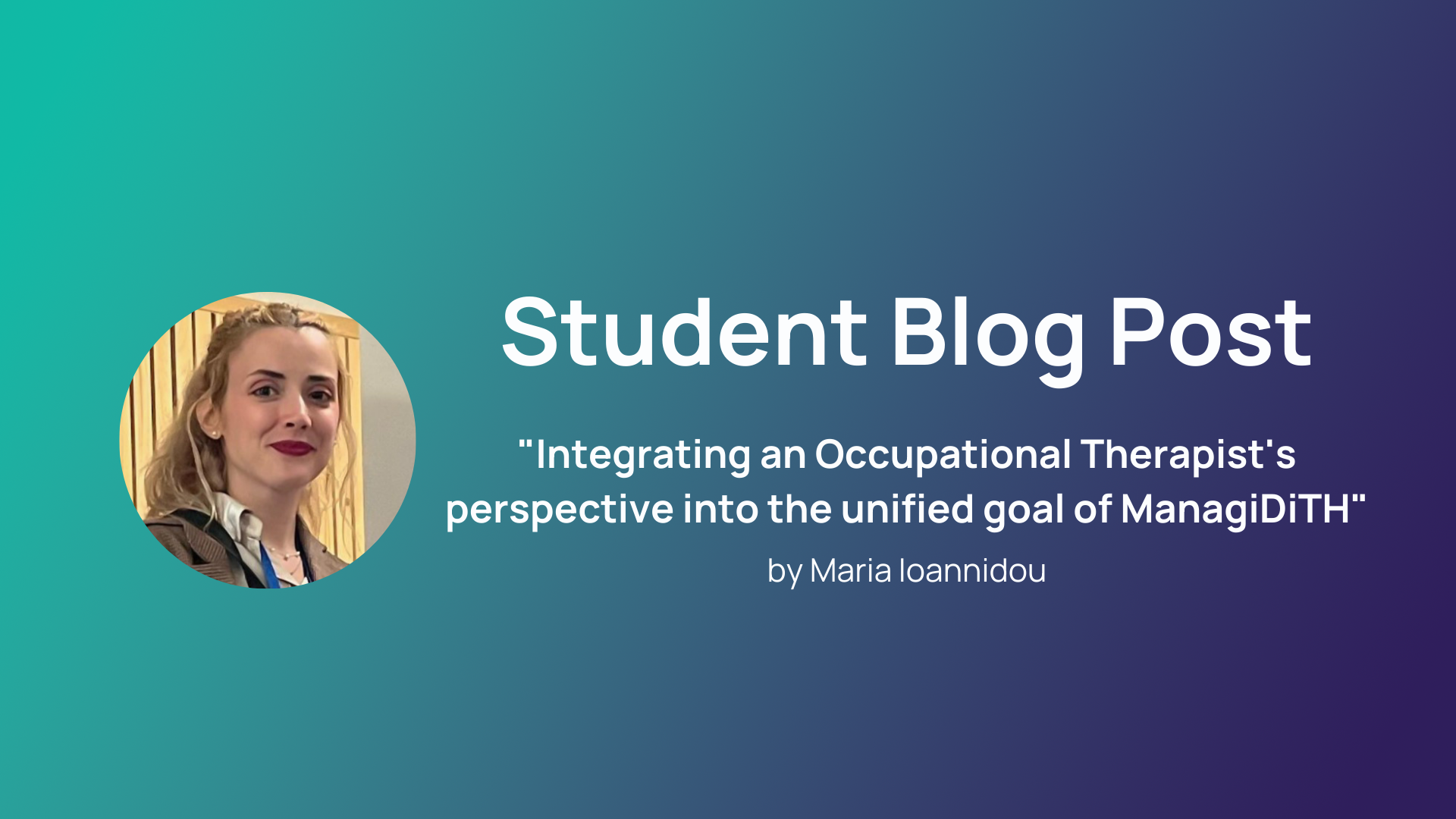Master

ISCTE - Instituto Universitário de Lisboa
ISCTE – Instituto Universitário de Lisboa is a renowned public research university in Portugal, offering high-quality education in various fields of study. With a history spanning over 50 years, the university has become a hub for innovative research and education in the country and beyond.
The Iscte – University Institute of Lisbon was founded in 1972 as one of Portugal’s first modern universities, with the central aim of studying labour and social dynamics in a rapidly changing world. Since its establishment, the university has expanded its disciplinary reach into four schools: Iscte Business School, the School of Sociology and Public Policy, the School of Technology and Architecture, the School of Social Sciences and Humanities and, the School of Applied Digital Technologies-Iscte-Sintra.
The new Master program in Managing Digital Transformation in the Health Sector is one of the latest additions to ISCTE’s academic offerings. With a focus on the rapidly evolving digital landscape of the healthcare industry, this program provides students with the necessary knowledge and skills to become leaders in managing and implementing digital transformation in healthcare organizations. ISCTE’s commitment to academic excellence and innovation, combined with its state-of-the-art facilities and experienced faculty, make it the perfect place to pursue a degree in this exciting and important field.

Gustave Eiffel University
Gustave Eiffel University was created in January 2020 and is based on an innovative model that brought together into a trifold structure universities, schools (including ESIEE Paris) and research bodies for the first time in France.
In France, the ManagiDiTH project is represented and carried out by the engineering school ESIEE Paris, which is a founding member of Gustave Eiffel University.
ESIEE Paris, the school of technological innovation, was created in 1904 and has immediately distinguished itself as an engineering school focused on innovation and entrepreneurship. One of its renowned former students is Marcel Dassault, founder of one of the very first industrial groups, the Dassault Aviation group. More recently, Yann LeCun, who is behind the current artificial revolution and works for META. Indeed, our school offers training in all areas of digital technology including Artificial Intelligence and Biotechnology & e-health which are the main topics of the ManagiDiTH project.
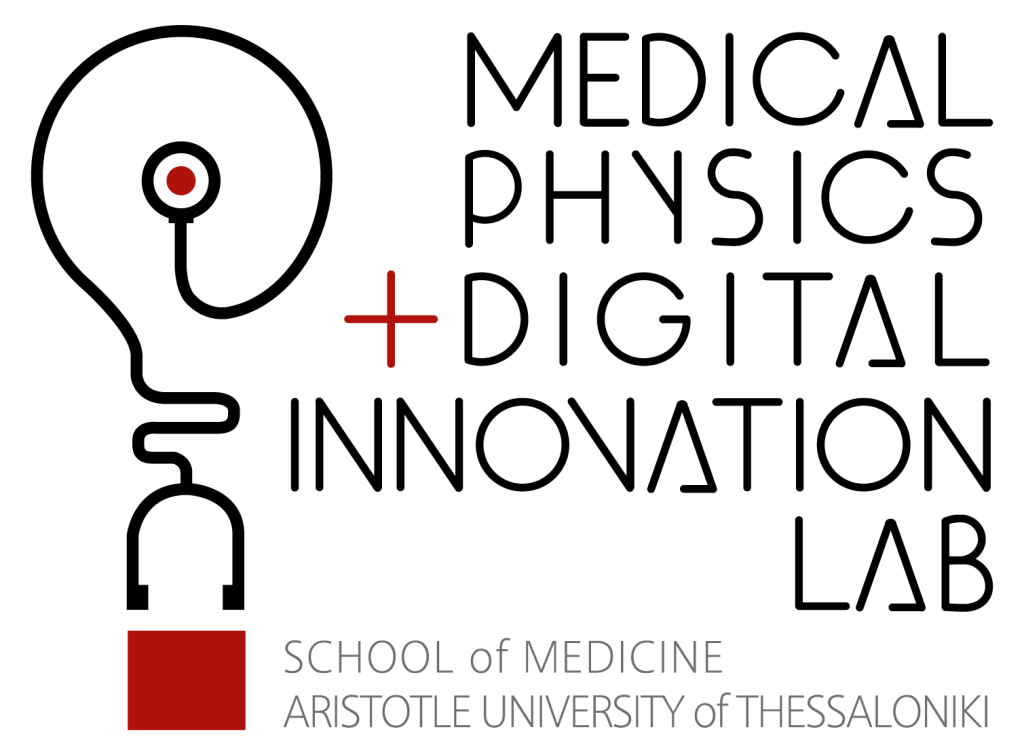
Aristotle Univeristy of Thessaloniki
Aristotle University of Thessaloniki (AUTH), founded in 1925, is one of Greece’s largest and most prestigious universities and it has a strong tradition of excellence in education and research. The School of Medicine at AUTH is particularly notable, having trained generations of medical professionals and made significant contributions to the advancement of medical science in Greece and beyond. AUTH’s commitment to excellence is reflected in its state-of-the-art facilities, highly qualified faculty, and extensive network of clinical and research collaborations.
AUTH participates in the ManagiDiTH project through the Lab of Medical Physics and Digital Innovation (iMedPhys). iMedPhys is a dynamic, interactive scientific community, the largest laboratory within the Health Sciences Faculty and one of the largest of the Aristotle University of Thessaloniki, considering the number of researchers employed and the number of projects, funding and overall academic work production. The Lab is pioneering in research fields such as assistive technologies for health and wellbeing, living labs, applied neuroscience, medical education technology and innovation and more. The mission of the Lab is to excel in training and multidisciplinary research in a setting that fosters creativity and synergy.

Laurea University of Applied Sciences
Laurea University of Applied Sciences (Laurea UAS, formerly Vantaa University of Applied Sciences and Espoo-Vantaa University of Applied Sciences), which was established in 1991, is one of the largest Universities of Applied Sciences in Finland with around 7,800 students and 600 staff members, and it operates in six different campuses. Laurea offers eighteen degree programmes, of which six are in English, in various fields including Business Management, Social Services and Health Care and Hospitality Management. Research, Development and Innovation (RDI) activities are closely linked to degree programmes and industry collaborations, including various partners, such as companies, public organizations, other universities and international partners. Laurea builds education around innovative pedagogical action model called Learning by Development (LbD), which has also been recognized internationally.
In ManagiDiTH project, Laurea’s LbD model will be incorporated into the new multidisciplinary Master programme, to include project-based learning and real-life collaboration between students and working life partners. We want to ensure that students graduating from this programme are able to understand Health and Social Care Informatics, as well as manage and implement digital transformation in Health and Social Care sector.
Master's programme details
Overview
Managing the Digital Transformation in the Health Sector offers you an European Master Degree Programme (EQF Level 7) that is
- Free of tuition fees
- Online and has flexible attendance
- Tailor-made since the majority of the programme is asynchronous, with the possibility to combine work and studies
The Joint Master’s programme Managing the Digital Transformation in the Health Sector is designed to manage the digitalization of health services, to promote the adoption of data science and information system resources to innovate clinical approach, services and to reorganize processes.
The Master’s programme will be based on a modular set of Curricular Units including a compulsory base as well as optional, flexible components giving the students the freedom to customize their educational journey and focus on two particular areas of specialization.
ManagiDiTH Master includes 3 main components: Health sector skills, Societal skills and Digital skills. Among the Digital skills component, the students may choose between two possible branches: Data Science and Interoperability according to their interest and background profile.
The curriculum organization comprises a total of 90 ECTS corresponding to three semesters of training. The diploma will be jointly issued by the three universities: ISCTE – University Institute of Lisbon, Laurea University of Applied Sciences and Aristotle University of Thessaloniki.
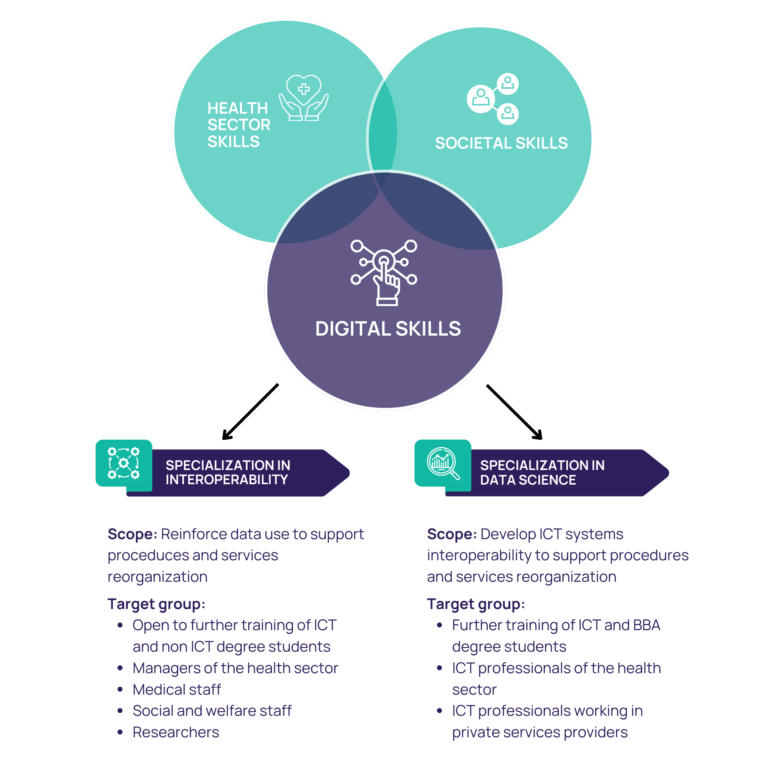
Ready to Apply?
Click the link below!
Students
The Master’s programme is designed for professionals engaged in or interested in engaging in the planning, coordination and implementation of digital transformation processes in the healthcare sector.
The program is suitable for professionals with various educational backgrounds, including Healthcare, Social and Welfare, ICT and Business Administration. The knowledge and experience levels of students may vary in specific health topics as well as in their background ICT profile and level of knowledge of related scientific areas.
The students sharing a common interest in the development and learning about health and social services may have different levels of contact, usage experience and scientific knowledge of digital technologies and topics.
The program is designed for applicants that have completed a Bachelor-level university degree and is open to students of all European Union countries.
Curriculum
The Master’s programme has 3 main components: 1. Health sector skills; 2. Societal skills; and 3. Digital skills.
It is composed of 10 curricular units* (6 mandatory and 4 optional) of 6 ECTS each (10 Units * 6 ECTS = 60 ECTS), plus the Master’s thesis unit (30 ECTS). In total, the master’s programme counts for 90 ECTS.
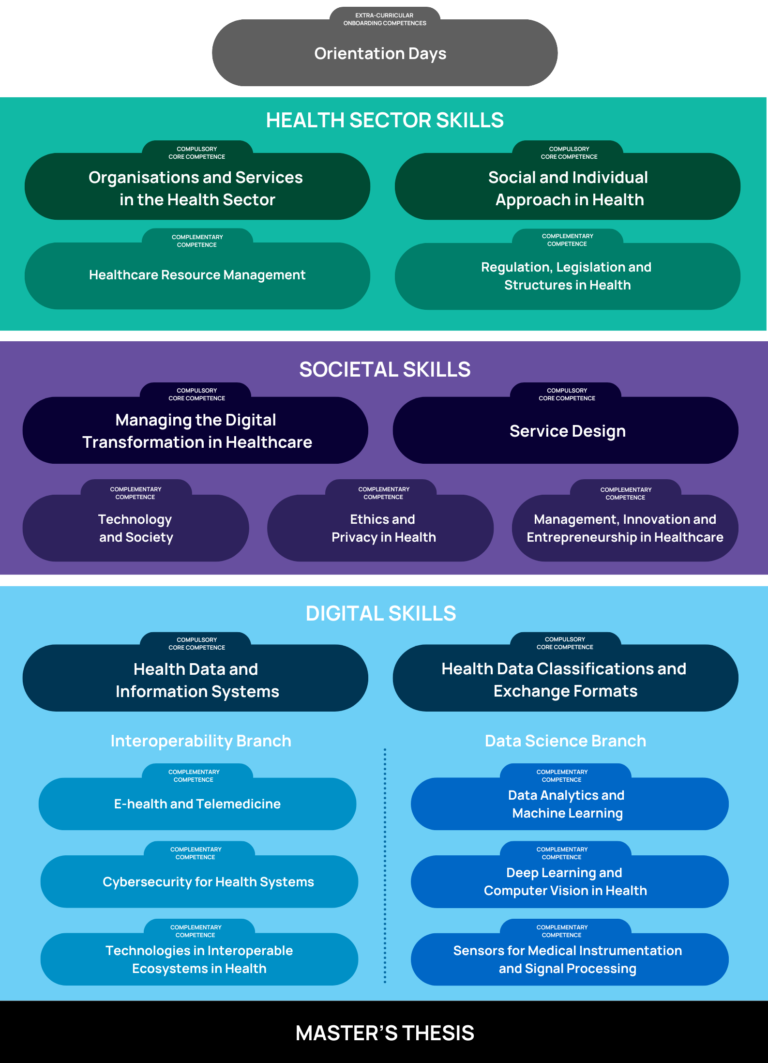
MB00 Orientation days (Extra Curricular Onboarding Course)
Mandatory orientation days
Students discover important practicalities on how to manage their Master’s studies. Additionally, they explore the ManagiDiTH online learning environment and study paths.
Mandatory curricular units
MH01 Organisations and services in the health sector
Lead teachers: Kristiina Rosqvist & Hannu Tikkanen (LAUREA)
Objectives
Equip students with the ability to recognize and understand the structures of diverse health and well-being services in an international context, covering regulations, objectives, and challenges.
MH03 Social and individual approach in health
Lead teachers: Markus Kanerva & Kaisa Hytönen (LAUREA)
Objectives
Explore the role and limitations of digital technology in individual health and its societal impacts, as well as introducing fundamental rules and regulations concerning health services and preventive care in public health.
MS07 Managing the digital transformation in healthcare
Lead teacher: Bruno Mataloto (ISCTE)
Objectives
Understand digital transformation trends, technologies, and strategies in the healthcare industry, providing them with the knowledge and skills needed to navigate and manage such initiatives within healthcare organizations.
MS09 Service design
Lead teachers: Virpi Kaartti & Anna Salmi (LAUREA)
Objectives
Understand the concepts and principles of systemic service design. Acquire a comprehensive understanding of applicability of service design in healthcare through online studies, interactive lectures, case studies, group discussions, and hands-on experiments.
MD10 Health data and information systems
Lead teacher: Luís Brito Elvas (ISCTE-IUL)
Objectives
Understanding the impact of health data and information systems on healthcare quality, safety, and cost-effectiveness, as well as the emerging trends and technologies in the field.
MD17 Health data classifications and exchange formats
Lead teacher: Panagiotis Bamidis (AUTH)
Objectives
Familiarize students with concepts, technologies, and methodologies behind health data standards, introduce them to relevant worldwide standards and organizations, and provide an understanding of various technologies and methodologies through practical examples, fostering interdisciplinary collaboration in analyzing healthcare classifications and structured data.
MT18 Master’s thesis
Lead teacher: Margarida Santos (ISCTE)
Objectives
Allow students a first research experience followed by a senior person, during which they mobilize the theoretical and methodological knowledge acquired in the taught part of the program and apply them critically to a thematic issue emerging from the curriculum.
Optional curricular units
OH02 Healthcare resource management
Lead teacher: Konstantinos Diamantis (AUTH)
Objectives
Equip students with a thorough understanding of resource management principles in the health sector, promoting a holistic grasp of the subject.
OH04 Regulation, legislation and structures in health
Lead teachers: Mikko Julin & Sari Sarlio-Siintola (LAUREA)
Objectives
Enhance students’ ability to analyze various models of well-being production, examining how well-being, its promotion, and prevention align with the values of the EU and fundamental rights at both EU and member state levels.
OS05 Technology and society
Lead teachers: Ari-Matti Erjansola & Hannu Tikkanen (LAUREA)
Objectives
Comprehensive understanding of the interconnections between science, technology, and society using diverse cases and examples, organized thematically.
OS06 Ethics and privacy in health
Lead teacher: Graça Canto Moniz (ISCTE)
Objectives
Understand key references in the digital domain, particularly in Ethics and Privacy, to enable informed and ethical interventions in promoting measures and policies during the healthcare sector’s digital transformation.
OS08 Management, innovation and entrepreneurship in healthcare
Lead teachers: Panagiotis Bamidis (AUTH)
Objectives
Equip students with the necessary knowledge and competences to thrive in the complex and ever-evolving healthcare industry. Develop a strong understanding of business planning, innovation, and entrepreneurship within the healthcare context.
OD11 Data analytics and machine learning
Lead teacher: Sancho Oliveira (ISCTE)
Objectives
Apply and understand various stages within the realm of machine learning. Recognize and locate crucial data points. Employ imputation techniques for data replacement and establish appropriate metrics. Identify and employ supervised and unsupervised algorithms suitable for health data analysis. Evaluate and interpret the performance of the various machine-learning algorithms on health data. Implement a machine learning pipeline in an ML toolkit.
OD12 Deep learning and computer vision in health
Lead teacher: Luís Brito Elvas (ISCTE-IUL)
Objectives
Knowledge on modern computational methods for manipulating and analyzing images, with a focus on automatic knowledge extraction, covering techniques for feature extraction and deep learning, particularly convolutional neural networks.
OD13 Technologies in interoperable ecosystems in health
Lead teacher: Stergiani Spyrou (AUTH)
Objectives
Provide students with a comprehensive understanding of the latest trends, technologies, and standards related to interoperability in the healthcare domain. The course aims to equip students with the knowledge and skills necessary to design, develop, and implement interoperable solutions that enable seamless and secure exchange of health information across different systems and stakeholders.
OD14 E-health and telemedicine
Lead teacher: Panagiotis Bamidis (AUTH)
Objectives
Develop a comprehensive understanding of the concepts and implications of e-health and telemedicine in the healthcare field. This includes exploring the role of digital technologies and telecommunication systems in transforming healthcare delivery.
OD15 Cybersecurity for Health Systems
Lead teacher: Carlos Serrão (ISCTE)
Objectives
Prepare students to identify the specific cybersecurity threats and risks health systems need to face (IDENTIFY), learn about the appropriate mitigations that need to be implemented to protect them (PROTECT), learn the techniques and mechanisms that can detect menaces (DETECT), identify how to handle the appropriate measures to face attacks to health systems (RESPOND), and recover health systems to normal operation after attacks (RECOVER).
OD16 Sensors for medical instrumentation and signal processing
Lead teacher: Octavian Postolache (ISCTE)
Objectives
Acquire general knowledge about biomedical sensors (principle, characteristics, applications) in a medical context and the signal treatment associated in order to have relevant information from the measurement. Provide compentencies of bibliographic analysis and oral presentation.
- The CU code reads as following: M or O for mandatory or optional, followed by H, S or D for Health Skills, Societal Skills or Digital Skills, B for boarding module and T for thesis. Then followed by increasing sequence of numbers.
This program is accredited in Laurea UAS in Finland, ISCTE University in Portugal and AUTH University in Greece.
Study Plan
Students learn various topics and develop critical thinking skills by solving real-world problems in online study units, using various pedagogical approaches suitable for an online environment. For example, a study unit could consist of weekly online meetings, and these meetings will contain sessions in which the students discuss the issues with their peers and work online with group assignments to develop a solution.
ManagiDiTH students have a great opportunity to study in a multicultural learning environment where the number of students can be up to 240 in total. This will offer opportunities to network widely among students from various backgrounds and different EU countries.
The ManagiDiTH Master’s degree includes two specialization branches. One in Data Science and the other in Interoperability. Students may choose the branch they want to specialize in according to their individual needs, interest, background and previous knowledge acquired on specific topics.
Requirements and Applying
Application periods
Application period has closed, thank you for applying!
Who can apply?
To apply to the ManagiDiTH Master’s programme, candidates must comply with the following:
- Nationality: Candidates need to be, at the time of their application (administrative and pedagogical registration with the Master’s programme at the time of its launch), an EU, EEA, or Swiss national.
- Academic requirements: Candidates must have a minimum of a Bachelor’s degree (180 ECTS) in Healthcare; Digital technologies; Management; Societal scientific domains, or degrees related to the Digital transformation in Healthcare.
- English language proficiency: If English is not their native language, candidates must be able to demonstrate an adequate level of English (B2 level in reading, writing and oral conversation). The above can be accomplished during the application process, either by:
- Uploading a valid certificate of English language proficiency (TOEIC, TOEFL, IELTS, or similar) or
- Responding to the language questions on the form on an adequate English level and demonstrating an adequate level of English in the application video.
- Work experience after graduation (previous Bachelor’s or Master’s degree): Work experience of at least two years (24 months) after the graduation date of a previous Bachelor’s or Master’s degree will be considered an additional asset for the application.
How to apply?
The application is made exclusively online. Candidates will be required to complete four forms to evaluate their background and to upload the following documents by the end date of the respective application period, in which the application is being submitted:
- Statement of purpose/Letter of intention/Letter of motivation/Cover letter
- Curriculum Vitae (CV) in Europass format:
- Academic results certificate
- Work experience certificate after graduation (when applicable)
- Application video
More detailed information and link to the application platform will be added here when the next application period begins.
Tuition Fees
As the ManagiDiTH Master’s programme is organized within an EU-funded project by the Digital Europe Programme, the Master’s programme is free of tuition fees for the duration of the project, including two cohorts of 240 students/each.
More information about scholarships and summer camps will be available soon.
FAQ
Below you can find some frequently asked questions and answers to these questions.
ManagiDiTH is an innovative Master’s degree programme that equips professionals in healthcare, digital technologies, management, and societal sciences with the skills needed to lead digital transformation in the health sector. The Joint Master’s programme is designed to ensure that graduates are well-prepared to plan and support the digitalisation of health services, implement new procedures, and develop services enabled by information and communication technologies. Graduates will also acquire the competencies necessary to ensure the interoperability of technological systems, configure information systems, and create applications that facilitate new organisational procedures, enhance communication with stakeholders, and improve the overall efficiency of healthcare organisations.
There final application period ended on May 19th, 2025.
ManagiDiTH is targeted to professionals with various educational backgrounds, including Healthcare, Social and Welfare, ICT and Business Administration. The program is designed for applicants that have completed a Bachelor-level university degree. The programme is open to students of all European Union countries. Students have a great opportunity to study in a multicultural learning environment where the number of students can be up to 240 in total.
The degree is intended to be completed in 2 years. The studyplan consists of 2 semesters: 1st semester September-January, 2nd semester February-June, and The Master´s Thesis.
The curriculum organization comprises a total of 90 ECTS corresponding to three semesters of training.
There are requirements concerning the applicants´ nationality, academic requirements and English language proficiency. Work experience after graduation (previous Bachelor’s or Master’s degree) will be considered an additional asset for the application.
As the ManagiDiTH Master’s programme is organized within an EU-funded project by the Digital Europe Programme, the Master’s programme is free of tuition fees for the duration of the project, including two cohorts of 240 students/each.
The Master´s programme is designed to be studied completely online, and it allows flexible attendance. Classes are offered from Monday to Friday at 5pm CET and recordings will be made of the sessions.
There are different requirements for receiving a student card and student benefits in different countries and universities. Check with your own institution and your country’s social services to see if you meet the requirements.
The majority of the programme is asynchronous, with the possibility to combine work and studies. The programme is based on a modular set of Curricular Units including a compulsory base as well as optional, flexible components, giving the students the freedom to customize their educational journey. A study unit could consist of weekly online meetings with sessions in which the students discuss the issues with their peers and work online with group assignments to develop a solution.
You can make your application on our application website when the application period starts.
Questions? Contact us!
For any questions related to the application procedure, please reach out to us at: managidith@iscte-iul.pt

